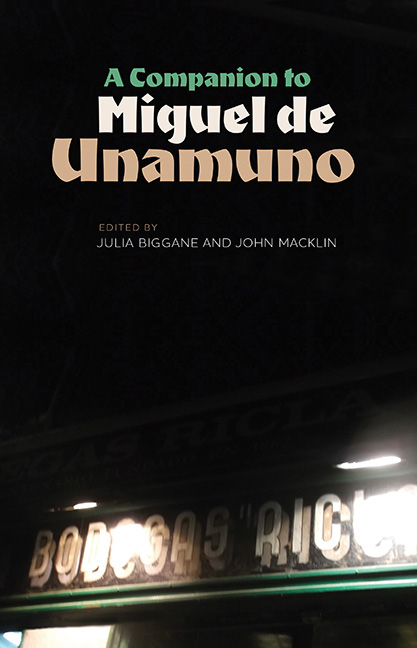4 - Return from Exile: Politics and Poetics 1930–1936*
Published online by Cambridge University Press: 21 May 2021
Summary
During the years of his exile in France (1924–1930), Unamuno suffered greatly as a victim of the Primo de Rivera military dictatorship, but he took on the struggle against the regime as a moral and political duty. This period was painful, then, but at the same time, exile became the best platform for the international dissemination and resonance of his work: he received many offers to translate his writings from a variety of countries. Unamuno was sixty-six years old when he returned to Spain, and the remaining seven years of his life were not tranquil or easy: he took on a formal political role as a member of parliament in the new Republic; his beloved wife, Concepción Lizárraga died in 1934; he became increasingly alienated from the Republic, and lent initial support to the military coup against it in 1936—a coup that triggered the Spanish Civil War. He continued to produce literary work only in the first part of this period; after 1931, his output was mostly journalistic, and social or political in content. This chapter will examine his final literary texts, and will explore his political activities and thought during the Second Republic. It will seek, in particular, to elucidate his actions and evolving position vis-a-vis the Civil War, which have been the subject of much debate, controversy and at times misrepresentation. Certainly his actions during the war have shaped his reputation in some quarters, so careful, objective analysis of his changing political position over this period is crucial.
Shortly after his return from exile, Unamuno completed three novellas—La novela de Don Sandalio, jugador de ajedrez, Un pobre hombre rico, o el sentimiento cómico de la vida, and San Manuel Bueno, mártir—that would turn out to be his last fictional works. This late literary production is partly characterised by a return to earlier preoccupations and themes: San Manuel Bueno, mártir reprises elements of the rural, intrahistorical existence represented in Paz en la guerra and En torno al casticismo; Un pobre hombre rico's subtitle – el sentimiento cómico de la vida – playfully evokes the title of the 1912 essay El sentimiento trágico de la vida, and both San Manuel Bueno, mártir and La novela de Don Sandalio explore the oppressive discontinuities between one's public persona and one's interior self—a focus of earlier texts such as Tulio Montalbán y Julio Macedo (1920).
- Type
- Chapter
- Information
- A Companion to Miguel de Unamuno , pp. 75 - 96Publisher: Boydell & BrewerPrint publication year: 2016



